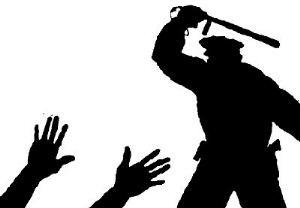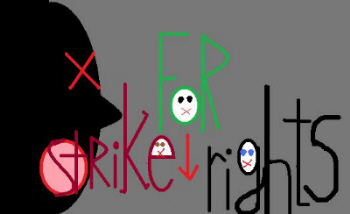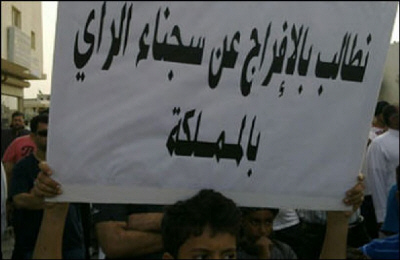Number of the prisoners of the freedom of thought in Saudi Arabia is a much larger number than those in Syria.
Nidal Hamade
| Dr. Haytham Manna'a |
Once the Human Rights Files Get Opened
Dr. Haytham Manna'a the mouthpiece of the Arabian Committee for Human Rights based in Paris says in an interview with Al-Manar Website that the number of the prisoners of the freedom of thought in Saudi Arabia is a much larger number than those in Syria. "There are around 5000 freedom of thought prisoners in Saudi Arabia, according to the Committee statistics, some of whom we have got no idea of their whereabouts for the past many years; for instance, those of Al-Khobar prisoners whose news has been totally unknown for the past six years," adds Dr. Manna'a.
The speaker for the Arabian Committee for Human Rights elaborates with our website about, "Numerous of arbitrary arrests in the Kingdom of Saudi Arabia for mere suspicions of mere intentions. Certain people were arrested because of their declaring their intentions for protests in support to the Gazans during the Israeli aggressions against the strip of Gaza, and those arrested people are still in jail till the moment."
Dr. Manna'a reiterates the moves the Arab Committee for the Human Rights is making in cooperation with international rights organizations in the past two months for one main reason: "The results of 300 trails have been secretly conducted with no one attending them, not even lawyers were allowed to communicate with the media whatsoever or even to see their clients sometimes; moreover, the rest of the trials were very clandestine.
| Participants in demonstration holding a signboard saying: We Demand the Release of Prisoners of Thought in the Kingdom; Saudi Arabia. |
This is the reason why we have fear about the destiny of the 5000 still held prisoners. There is a general caution among the international and the Arab human rights organizations due to the situation correlated with arbitrary arrests in the Kindgom. This issue has been calling for the need of issuing additional reports as you will see in September and October with no political agenda beforehand, yet they will be not only due to the infringements committed by the authorities in the Kingdom but also due to its continuing political war against terrorism at the time that such futile war has been dropped by the American administration."
From its side, the Human Rights Watch Organization had released a report on 3/9/2009 about the human rights in Saudi Arabia including numerous issues, and the report specified the infringements and the sectarian discrimination and class distinction against the Shi'as as such:
a. There have to be steps to rid of discrimination based on faith against the Shi'as when it comes to employment. Also, there should be a review of the governmental employment policy so that it would reflect the religious structure of the various provinces of the Kingdom. Furthermore, the proficient Shi'as have to be encouraged to assume local governmental high ranking positions; particularly in the regions where the Shi'as fairly large minorities or the majority like in (Qatif, Al-Ahsa, Najran, Al-Medina). There must be special focus on eradicating discrimination in employment in the sector of education. In addition, the Shi'as must be allowed to study in military schools and join drafting. Also, a consideration of installing Shi'ite figures in the central government, such as ministers, must be looked into.
 b. A procedure to eliminate discrimination based on faith in the judicial system must be taken. Shi'as must be allowed to qualify for judicial positions in courts in the ordinary levels in addition to the four Shia' judges currently positioned in Al-Qatif and Al-Ahsa courts (whose authority is limited to civil cases). There must be a guarantee that any Shiite must never be denied the right to have justice and not to be denied the right to qualify for witnessing as a witness, or to work as a lawyer, due to the faith identity of the person concerned.
b. A procedure to eliminate discrimination based on faith in the judicial system must be taken. Shi'as must be allowed to qualify for judicial positions in courts in the ordinary levels in addition to the four Shia' judges currently positioned in Al-Qatif and Al-Ahsa courts (whose authority is limited to civil cases). There must be a guarantee that any Shiite must never be denied the right to have justice and not to be denied the right to qualify for witnessing as a witness, or to work as a lawyer, due to the faith identity of the person concerned.
c. There must be steps to eradicate discrimination in faith, and Shia's must be allowed to teach religion at schools. There must never be discrimination when issuing permission upon planning and building Shiite mosques and husayniyat (cultural centers), and similar parlors for the use of religious and cultural purposes.
The imams of the Shia's and their mosques must be granted the same amount of funds provided to the Sunni imams and mosques by the government.
Moreover, there must be no interference in the Shiite religious observances whether common or individual, and their right in worship services must be protected with no interference by others. The imams of the Shia's must never be arrested because of their religious practices. Also, other followers of other faiths such as Christianity, Hinduism, Buddhism must be allowed to practice their religious rituals without state interference.
 d. The senior governmental officials must condemn the rhetoric of hate directed toward the Shiite senior clerics, who are yet sometimes governmental officials; furthermore, public declaration of approval of the Shia's and the Ismaelis as full standing citizens must be shown without discrimination. The Shia's and the Ismaelis must be enlisted in the Saudi diplomatic corps, including the Saudi diplomatic delegation in the conference organization.
d. The senior governmental officials must condemn the rhetoric of hate directed toward the Shiite senior clerics, who are yet sometimes governmental officials; furthermore, public declaration of approval of the Shia's and the Ismaelis as full standing citizens must be shown without discrimination. The Shia's and the Ismaelis must be enlisted in the Saudi diplomatic corps, including the Saudi diplomatic delegation in the conference organization.
The Human Rights Watch had issued a report on April 18th saying that the Saudi authorities had arrested more than 160 activists since February as the Kingdom was trying to fortify itself against public uprising sweeping the Arab countries. The report called Minister of Interior Prince Nayef to immediately release what it described as peaceful protestors and added that their arrest is considered an infringement against the international law of human rights.
Christopher Wilk, a researcher in the organization, criticized what he described as silence on the behalf of the U.S.A. and the European Union toward arresting peaceful protestors he adds:" It does not have to be a matter of choice for Brussels and Washington when it comes to the imprisonment of 160 peaceful protestors ….. and with a surge in the number of Saudi political prisoners, the American and European silence becomes more deafened."
In the same line, sources in the international alliance for resisting torture including rights societies some of which are the Arab Committee for Human Rights, the International Observer for Human Rights, and Karamah Center that the Saudi file is going to be full of infringements in the report to be issued by Human Rights watch and Human Rights Societies to be released in 2011. Dr. Haytham Al-Manna'a announced that there would be reports coming out in September and October about violating human rights in Saudi Arabia that would highlight a drastic decline in this subject.
See also:
Saudi Arabia under West’s Microscope - Part I
Saudi Arabia under West’s Microscope - Part II


